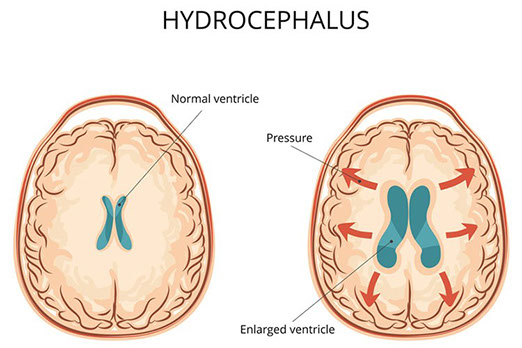What Is Hydrocephalus?
- Hydrocephalus is a condition that occurs when fluid builds up in the skull and causes the brain to swell. The name means “water on the brain.”
- Brain damage can occur as a result of the fluid buildup. This can lead to developmental, physical, and intellectual impairments. It requires treatment to prevent serious complications.
- Hydrocephalus mainly occurs in children and adults over 60, but younger adults can get it too. The National Institute of Neurological Disorders and Stroke (NINDS) estimates that 1 to 2 of every 1,000 babies is born with hydrocephalus.

What Causes Hydrocephalus?
Cerebra Spinal fluid (CSF) flows through your brain and spinal cord in normal conditions. Under certain conditions, the amount of CSF in your brain increases. The amount of CSF can increase when:
- A blockage develops that prevents CSF from flowing normally.
- There is a decrease in the ability of blood vessels to absorb it.
- Your brain produces an excess amount of it
Too much of this fluid put your brain under too much pressure. This pressure can cause brain swelling, which can damage your brain tissue.
Normal Pressure Hydrocephalus
When hydrocephalus occurs in adults, CSF levels rise but the amount of pressure is usually normal. It still causes the brain to swell and can lead to impaired functioning. In adults, this condition usually results from conditions that prevent CSF from flowing. However, in some cases, there is no known cause.
You might be at higher risk if you have experienced any of the following:
- Brain-related infections such as meningitis
- Head injuries
- Bleeding from a blood vessel in your brain
- Brain Treatment
Reducing Your Risk of Hydrocephalus
- You can’t prevent hydrocephalus, but you can lower your risk and your child’s risk for developing the condition.
- Make sure you get prenatal care during pregnancy. This can help reduce your chance of going into premature labor, which can lead to hydrocephalus.
- Getting vaccinations can help prevent illnesses and infections that are linked to hydrocephalus. Having regular screenings can also ensure that you get prompt treatment for illnesses or infections that could put you at risk of hydrocephalus.
- Use safety equipment, such as helmets, to prevent head injuries when doing activities like riding a bike. You can also lower your risk of head injuries by always wearing a seat belt.
- Young children should always be secured in a car seat. You can also prevent head injuries by making sure your baby equipment, such as strollers, meets safety standards.


